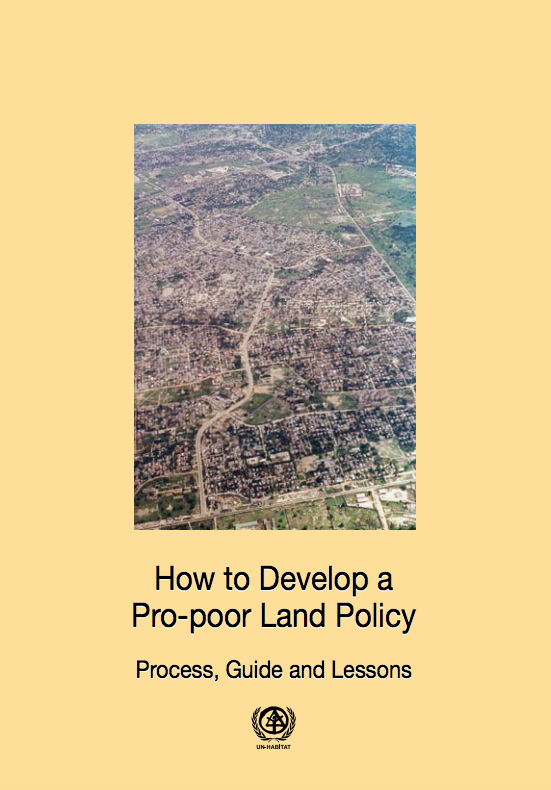Focal point
Location
The Global Land Tool Network (GLTN) is an alliance of global regional and national partners contributing to poverty alleviation through land reform, improved land management and security of tenure particularly through the development and dissemination of pro-poor and gender-sensitive land tools.
Secure land tenure and property rights are fundamental to shelter and livelihoods as well as the realisation of human rights, poverty reduction,economic prosperity and sustainable development.
The Global Land Tool Network (GLTN) main objective therefore is to contribute to poverty alleviation and the Millennium Development Goals through land reform, improved land management and security of tenure.
UN-Habitat through GLTN continues to work towards this with partners who include international civil society organizations, international finance institutions, international research and training institutions, donors and professional bodies.
Most developing countries use conventional land administration systems which cover less than 30 per cent of the country, leaving up to 70 per cent of citizens looking to informal and/ or customary approaches for their tenure security.
While there are many examples of good land policies, there are few policies that have been fully implemented due to lack of pro-poor, gendersensitive and largescale land tools. Further, conventional land titling approaches have largely failed to deliver their expected results since existing technical solutions are too expensive, inappropriate for the range of tenure found in developing countries, unsustainable financially or in terms of available capacity, and instead a range of land tenure options is more appropriate.
Core Values
Consequently, GLTN's core values and principles are founded in the development of land tools that are:
- Pro poor;
- Equitable;
- Sustainable;
- Affordable;
- Systematically large scale /scalable; and,
- Gender-sensitive, while taking into consideration:
- Good governance;
- Subsidiarity; and,
- The Continuum of Land Rights.
GLTN Objectives and Mandate
GLTN has developed a global partnership on land issues pulling together global partners, as well as many individual members. These partners include international networks of civil society, International Finance Institutions, international research and training institutions, donors and professional bodies. It continues to take a more holistic approach to land issues by working towards the following objectives:
- The establishment of a continuum of land rights, rather than just focus on individual land titling
- Improving and developing pro-poor land management, as well as land tenure tools
- Unblocking existing initiatives Assisting in strengthening existing land networks
- Supporting in the development of gendered land tools which are affordable and useful to grassroots
- Improving the general dissemination of knowledge about how to improve security of tenure
- Improving the general knowledge dissemination on the improvement of security of tenure
Resources
Displaying 271 - 275 of 286Land Registration in Ethiopia: Early Impacts on Women
Study in the Oromiya and Southern Nations, Nationalities and Peoples regions of Ethiopia assesses the impacts of land registration and certification since 2004, including joint certification for husbands and wives. Includes gender implications of land certification and empowerment of women, position of polygamous wives, perceptions of benefits of the reform, recommendations.
From Being Property of Men to Becoming Equal Owners? Early Impacts of Land Regulation and Certification of Women in Southern Ethiopia
A study in the Oromiya and Southern Nations, Nationalities and Peoples regions of Ethiopia assesses the impacts of land registration and certification since 2004, including joint certification for husbands and wives. Includes gender implications of land certification and empowerment of women, position of polygamous wives, perceptions of benefits of the reform, recommendations.
Improving Slum Conditions through innovative Financing
This publication is a summary report of the seminar "Improving Slum Conditions through Innovative Financing", which was jointly organized by the International Federation of Surveyors (FIG) and the United Nations Human Settlements Programme (UN-Habitat) and took place in Stockholm, Sweden on 16–17 June 2008. This two-day seminar, which was dedicated to adequate and affordable housing for all, was an integrated part of the FIG Working Week.
How to establish an effective land sector
This guide presents a general overview on institutional harmonisation processes, i.e. the various factors and tools included in fostering institutional harmonisation in a sector. The experiences informing this document mainly result from the tacit knowledge of the land sector in Kenya by UN-Habitat and the Global Land Tool Network (GLTN). They are complemented by experiences from other sectors (such as water, governance and decentralisation), African countries and from state as well as nonstate actors.
How to develop a pro-poor land policy: Process,Guide and Lessons
Developing new land policies can be a long and difficult process. It is even more so if the policies are to be pro-poor – if they are to help correct the disadvantages that poor people typically suffer in many areas of land policy.








